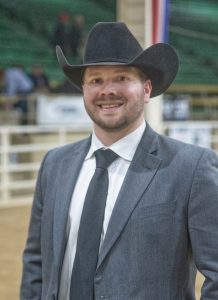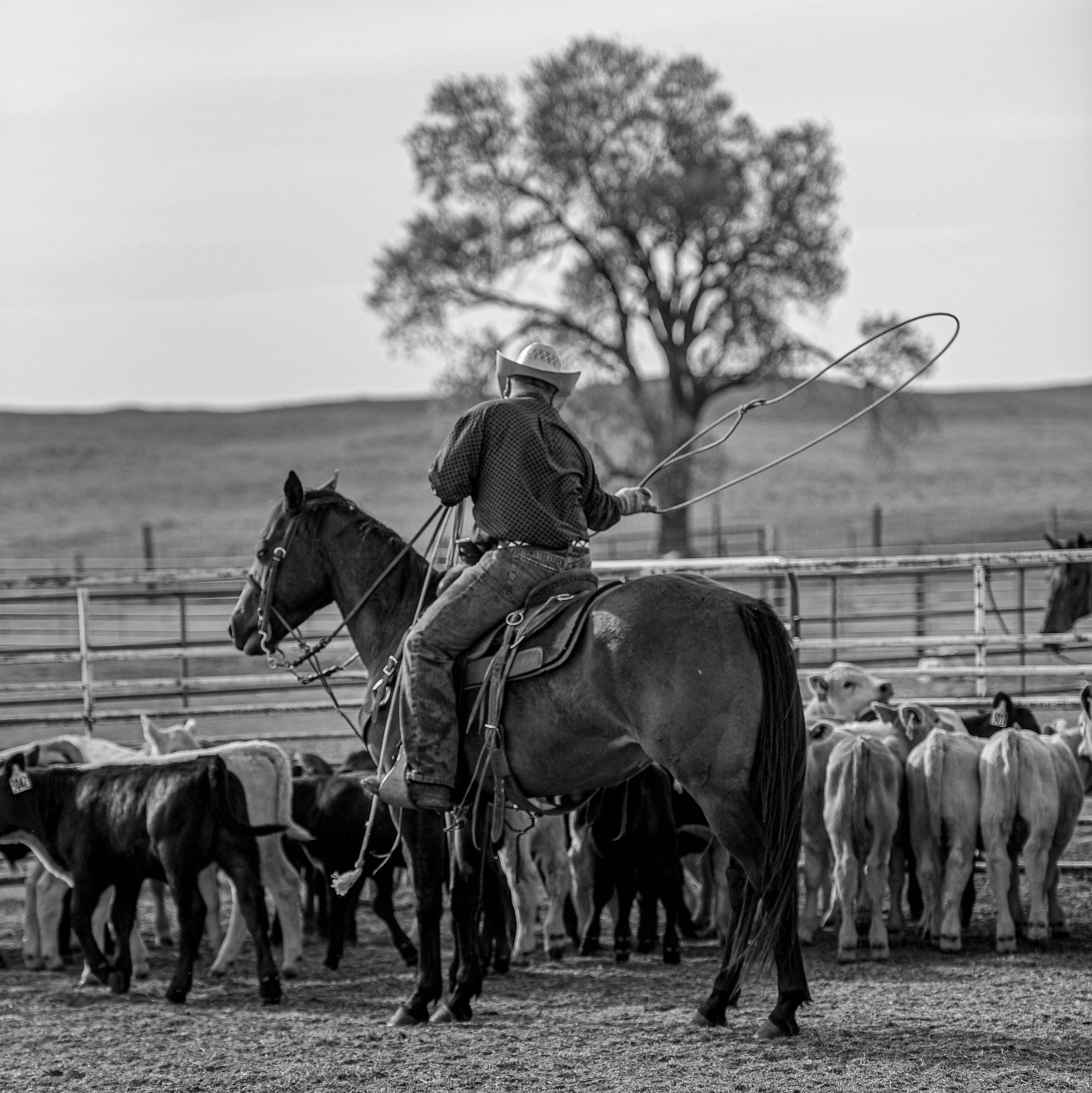For a decade Joe Epperly has served BIF with a hands-on work ethic and a can-do attitude.

Growing up in Virginia, Joe Epperly was involved in agriculture and specifically the livestock industry since he could walk. His passion for the industry, unmatched work ethic and ability to listen and lead steered his path to serving as the 2022-23 Beef Improvement Federation president.
“Joe is one of those folks who epitomizes an effective board member,” explains Matt Perrier, 2021-22 BIF president from Eureka, Kansas. “He’s curious, thoughtful and he makes sure that there is ample opportunity for discussion and debate on impactful issues. At the same time, he understands that everyone’s time is valuable, so he can be counted on to keep a meeting moving along whenever possible.
“Besides his effectiveness in the board room, Joe is a thinker and is very competitive. These two characteristics drive him to constantly look for better solutions to our industry’s challenges. With his hands-on work ethic and can-do attitude, he is always a source of new ideas and practical perspectives. He was a great person to serve with during my time on the BIF board.”
Early years
Epperly was showing lambs at age 4 and cattle at 9. During his youth, Epperly’s father, Albert, managed some of the largest, most influential Angus herds in the East. After his grandfather, Frank, retired, he started a livestock market with Albert’s help — Springlake Livestock Market in Moneta, Virginia. Albert and family were in the process of moving to Champion Farms in Bidwell, Ohio, when Frank had a heart attack in 1989. The family instead moved back to Bedford County to run the livestock market. They operated the market until 2004 when it was sold.
Epperly graduated from Virginia Polytechnic Institute and State University (Virginia Tech) with a degree in animal and poultry sciences in 2009.
“BIF supplied most of my additional education,” he explains. “It’s funny to look back and see how you ended up where you are from where you had planned. I went to Virginia Tech to be a civil engineer but decided to take intro to animal science with Dr. Bill Beal. Dr. Beal found out that I didn’t have class on Tuesday and Thursday mornings and offered me a job on the research farm. It changed the direction of my life. I changed majors after three years when I finally got up the courage to tell my dad.”
After graduating from Tech, he got a job at Murcielago Farms in Scottsville, Va., where he worked for 18 months until he got a call from Bob Hough who hired him at the North American Limousin Foundation (NALF) as the director of commercial marketing in November 2010.
In January 2011, Hough left NALF and left a hole in performance programs that, little by little, Epperly was asked to fill.
“Mark Anderson came in and gave me leeway and guidance to take it and run,” Epperly recalls. “It gave me opportunities to attend meetings and serve on advisory boards that I had no business on because I was the only one there. I soaked it up. Read the BIF Guidelines like it was a holy text and quizzed Dr. Weaber and Dr. Spangler to the point that I’m surprised they still speak to me.”
Since 2017, Epperly has served as the director of genetics and sales for Wagonhammer Ranches in Albion, Nebraska. The Wagonhammer herd includes about 2,500 cows — 1,000 registered Angus, Charolais and Simmentals and 1,500 commercial cows. They currently performance test and sell around 300 bulls per year including producing bulls for their own commercial bull needs. The ranch hosts two sales a year — the Total Performance Production Sale in March and the Total Package Female Sale in November. The operation also includes a 5,000-head feedlot where they feed out their own and purchased cattle.
“It’s probably weird but BIF had a major role in shaping who I am today,” Epperly explains. “I was just a kid a couple years out of undergrad, with only a B in animal breeding and genetics, faced with 1,000 members all with questions about their EPDs and contemporary groups. A hard copy of the guidelines was my main guide and it opened doors for me to travel and to speak across the country and across the world. I would not be managing Wagonhammer without that time and without the relationships made through BIF.”
Matt Spangler, University of Nebraska professor and BIF board member, says, “Joe’s unique experiences through his previous work at a breed association and current management role in a seedstock operation allowed him to understand multiple sides of all issues. He’s clearly been a strong supporter of BIF and the science that underpins it for several years prior to assuming a leadership role in the organization. His knowledge of the central mission of BIF prior to becoming president no doubt helped guide him during his successful tenure.”
BIF tenure
In 2013, Epperly was asked if he would be interested in serving on the BIF board. He has served on the board since that time other than a one-year break in 2018 when he transitioned from NALF to Wagonhammer and from a breed representative to a producer representative on the board.
“My first two years on the board could be summed up by ‘second,’ which I can always be counted on for in a meeting and about the only positive contribution I had,” Epperly says. “During the last 10 years, I think we have changed the business of BIF completely. We added a communications division, increased our presence on social media and publications, moved the guidelines to a more living document and improved resource through the Wiki format, became somewhat of a repository of history, and we are making strides to drive and influence action on research in the beef industry. All the while hosting the premier conference for interaction between scientists and producers in the beef industry worldwide.”
When asked how he feels about serving as the 2022-23 BIF president, he said, “Honored, blessed, intimidated and possibly not in that order. I have a lot of respect for the previous presidents of BIF which is a who’s who of the beef industry. I just hope that I’ve been able to continue the mission put forth by previous boards and keep expanding the relevance of quality data collection and usage to the beef industry.”

BIF today
“I think in the last 10 years BIF has been working to increase its relevance in the industry and I think we have made great strides there,” Epperly explains. “I think the symposium’s reach across the world and ability to bring together science, industry and producers to discuss and meet the challenges of a global marketplace remains firm. The guidelines continue to be a resource to people around the world and the basis for objective data analysis in the industry. Some of the work we are starting to advance including research priorities using the weight and talent of BIF membership has as much potential to impact future generations as the foundation of BIF.”
Natural leader
Epperly’s drive to be an industry leader started at a young age. He served on the Virginia Junior Angus Association Board of Directors and was a 2005-2006 Virginia State FFA Officer, after which he served on the National Junior Angus Association Board of Directors from 2006-2008.
Along with serving on the BIF board, he currently is president of the Nebraska Angus Association, a member of American International Charolais Association breed improvement and commercial committees, and is superintendent of the Aksarben Beef Show as well as the National Western Stock Show Market Beef Show.
“Joe has a deep passion for performance cattle breeding and the mission of BIF,” summarizes Bob Weaber, BIF executive director. “He’s tirelessly served the beef industry and BIF through leadership on the board of directors. Joe brings a unique perspective to the board having served most recently as a producer representative and formerly as a breed association representative. Joe’s experience in both realms has fostered his understanding of the science behind genomics, gene editing and national cattle evaluation systems and the application of those tools in seedstock production. We’re thankful for Joe’s visionary leadership and service to BIF.”
